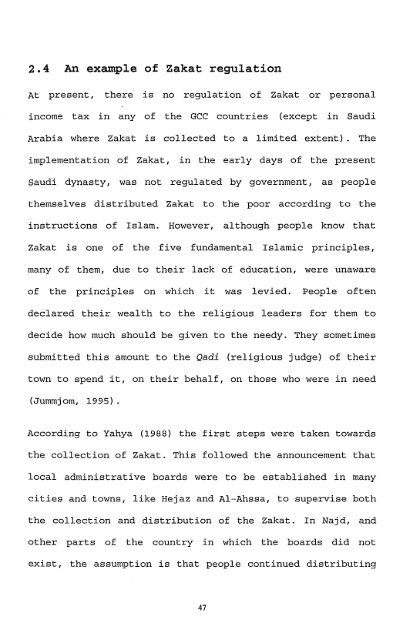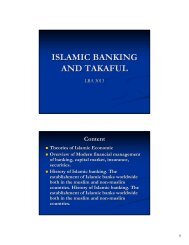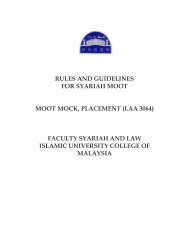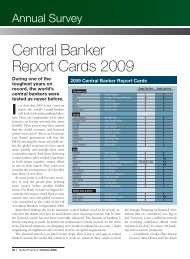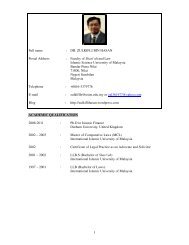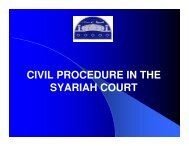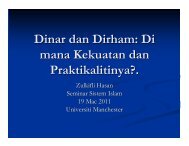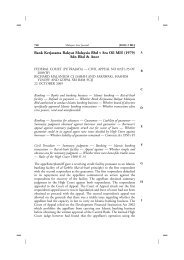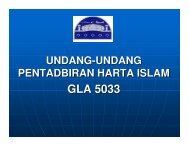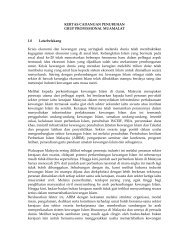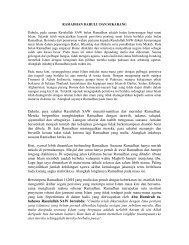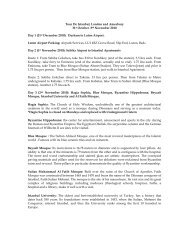- Page 1 and 2:
Towardsa unified system ofZakat acc
- Page 3 and 4:
ACKNOWLEDGEMENTSIN THE NAME OF ALLA
- Page 5 and 6:
PAGINATION ERROR INORIGINALTHESIS
- Page 7 and 8:
ContentsPageDeclarationiDedicationi
- Page 9 and 10:
4.4.1.1 Zakat on pastoral animals 1
- Page 11 and 12:
6.2.5 The percentage of Zakat thats
- Page 13 and 14: List of tablesPageTable 2.1 Economi
- Page 15 and 16: GLOSSARY OF TERMSFai property acqui
- Page 17 and 18: ChapteroneIntroduction
- Page 19 and 20: interest investment model, where th
- Page 21 and 22: egulating Zakat has been employed a
- Page 23 and 24: four countries due to the limitatio
- Page 25 and 26: Co-operation Council, location, cli
- Page 27 and 28: Chapter seven summarises thefinding
- Page 29 and 30: ChaptertwoGeneral background to the
- Page 31 and 32: in the following section, various f
- Page 33 and 34: have an oil-based economy. Its oil
- Page 35 and 36: anking and investment institutions
- Page 37 and 38: 2.1.2 KuwaitKuwait is situated at t
- Page 39 and 40: 2.1.2.2 Social, Cultural and politi
- Page 41 and 42: Saudi Arabia is a monarchy, with st
- Page 43 and 44: In addition, Saudi Arabia is also p
- Page 45 and 46: important to the everyday life of S
- Page 47 and 48: and the city of Abu Dhabi is the ce
- Page 49 and 50: 2.1.4.2 Social, Cultural and politi
- Page 51 and 52: The Omani economy mainly depends on
- Page 53 and 54: In recent years, the government has
- Page 55 and 56: sv2ýJbbQr N m N n O h CC o O n h O
- Page 57 and 58: 11 percent in 1995. In Kuwait, the
- Page 59 and 60: general. All countries, except Qata
- Page 61 and 62: with, they all share the same faith
- Page 63: " Agreement on linking the electric
- Page 67 and 68: offices throughout the Saudi Kingdo
- Page 69 and 70: future is uncertain. In trying to s
- Page 71 and 72: ChapterthreePrinciples of Islamic E
- Page 73 and 74: and equitable distribution of incom
- Page 75 and 76: has two main sources: primary and s
- Page 77 and 78: Although various Islamic schools an
- Page 79 and 80: Muslim countries such as Pakistan a
- Page 81 and 82: This definition also suffers from s
- Page 83 and 84: elationship that a human being must
- Page 85 and 86: The search for lawful wealth is reg
- Page 87 and 88: from place to place and from time t
- Page 89 and 90: Movement towards greater economic a
- Page 91 and 92: 3.4.5 Freedom of ownership and acti
- Page 93 and 94: Public ownership is also recognised
- Page 95 and 96: ates in his Code and suggested the
- Page 97 and 98: These last verses clearly show that
- Page 99 and 100: orrower for the period of time the
- Page 101 and 102: choose and what maximises their uti
- Page 103 and 104: eliminated at the outset in Islam.
- Page 105 and 106: aspect of self-interest he or she s
- Page 107 and 108: it can be said that an Islamic gove
- Page 109 and 110: certain circumstances not. to cance
- Page 111 and 112: 3.9 Islamic Economics in Practice.A
- Page 113 and 114: deficit for many years. Pakistan an
- Page 115 and 116:
It was argued that the goal of well
- Page 117 and 118:
economic activities, social and eco
- Page 119 and 120:
ChapterfourZakat and its position i
- Page 121 and 122:
Although these methods are currentl
- Page 123 and 124:
4.1.1 Goals of ZakatMany Muslim sch
- Page 125 and 126:
them to contribute positively to th
- Page 127 and 128:
een distributed to non-profit Musli
- Page 129 and 130:
sectors of the Sunni Islamic sect,
- Page 131 and 132:
4.3.2 WealthThe teachings of the pr
- Page 133 and 134:
Islam without regard to any debt on
- Page 135 and 136:
4.3.2.4 The passage of a yearThe pa
- Page 137 and 138:
oken bones, or gouged eyes (Joan, 1
- Page 139 and 140:
the total amount becomes due. The d
- Page 141 and 142:
example,today is the date that Zaka
- Page 143 and 144:
this item should be considered as p
- Page 145 and 146:
Prophet's obligations. The amount o
- Page 147 and 148:
4.4.4.2 Starting point of Zakat dut
- Page 149 and 150:
such as income earned from practisi
- Page 151 and 152:
There is a widely known view of Mal
- Page 153 and 154:
amount (2.5 percent). In Saudi Arab
- Page 155 and 156:
4.5.2 Department of General IncomeE
- Page 157 and 158:
He further describes some condition
- Page 159 and 160:
year. Zakat is payable on both the
- Page 161 and 162:
through proper channels of the Prop
- Page 163 and 164:
therefore, make a list of the avera
- Page 165 and 166:
unrealised profits should be net of
- Page 167 and 168:
Balance Sheet 31-12-19X230-12-XXX13
- Page 169 and 170:
literature behind the selection of
- Page 171 and 172:
Zakat system supposedly to be appli
- Page 173 and 174:
ChapterfiveResearchmethodology5.0 I
- Page 175 and 176:
5.2 Research questions5.2.1 Zakat p
- Page 177 and 178:
distribution to those deserving it
- Page 179 and 180:
egulation, 1988). Companies, using
- Page 181 and 182:
5.2.5 Zakat regulationRegulating Za
- Page 183 and 184:
capital owners (Article 70).The mea
- Page 185 and 186:
authorities and securities regulato
- Page 187 and 188:
5.2.8 Variations in accounting meas
- Page 189 and 190:
applicability to part of the capita
- Page 191 and 192:
then they must be discounted since
- Page 193 and 194:
as well as with the standard for th
- Page 195 and 196:
5.2.10 Percentage of ZakatWhen Zaka
- Page 197 and 198:
5.2.12 Zakat location in the annual
- Page 199 and 200:
Zakat payer are added to the profit
- Page 201 and 202:
ich. This is what Islam stands agai
- Page 203 and 204:
eing to make it Islamic, strong, gr
- Page 205 and 206:
the present study would have been p
- Page 207 and 208:
a wide geographical area, involving
- Page 209 and 210:
The fifth and last part sought the
- Page 211 and 212:
academics, government officials, in
- Page 213 and 214:
Kuwait. Some individual investors c
- Page 215 and 216:
out of 80 (31 percent) and the Unit
- Page 217 and 218:
important, or agree to disagree. Th
- Page 219 and 220:
KW=12LNNk2 I+ 1) j=1Ellýj-3(N + 1)
- Page 221 and 222:
ChaptersixStatisticalanalysisofthes
- Page 223 and 224:
analysis of respondents background
- Page 225 and 226:
Education and age are not the only
- Page 227 and 228:
years. Twenty-three percent reveale
- Page 229 and 230:
6.2 Major results6.2.1 Zakat paymen
- Page 231 and 232:
Al-Sultan (1997) who argued that Mu
- Page 233 and 234:
Department of Zakat, but not to the
- Page 235 and 236:
ox. It is highly likely that the re
- Page 237 and 238:
to the national banks where the mea
- Page 239 and 240:
difference in means is highly insig
- Page 241 and 242:
collect and distribute only 1.25 pe
- Page 243 and 244:
The ranking of institutions' means
- Page 245 and 246:
Firstly, occupation seems to affect
- Page 247 and 248:
It was, however, roughly find two f
- Page 249 and 250:
collection), as the chi-square stat
- Page 251 and 252:
financial statements such as profit
- Page 253 and 254:
like to be on the safe side as far
- Page 255 and 256:
It is uncontested that the degree o
- Page 257 and 258:
espondentsseem to share some doubt
- Page 259 and 260:
score to themselves on the suggesti
- Page 261 and 262:
statistics were not significant at
- Page 263 and 264:
Secondly, Gulf countries have not y
- Page 265 and 266:
Table 6.13(b)Reasons behind low lev
- Page 267 and 268:
Alms (Zakat) are for the poor, the
- Page 269 and 270:
Table 6.14(b) Appointment and pay f
- Page 271 and 272:
five out of seven items, suggesting
- Page 273 and 274:
discussed earlier remains unchanged
- Page 275 and 276:
4.61. The opinion of accounting fir
- Page 277 and 278:
6.5 SummaryThis chapter has empiric
- Page 279 and 280:
ChaptersevenSummaries,conclusionand
- Page 281 and 282:
7.1.2 Chapter twoThis chapter provi
- Page 283 and 284:
(profit) with the borrower. Any dea
- Page 285 and 286:
countries, Zakat is paid by all tho
- Page 287 and 288:
Another advantage is the accumulati
- Page 289 and 290:
This survey reveals that almost 40
- Page 291 and 292:
of the total Zakat amount due. Over
- Page 293 and 294:
Most respondents prefer a partnersh
- Page 295 and 296:
measurement and disclosure of Zakat
- Page 297 and 298:
measurement be re-defined in such a
- Page 299 and 300:
" Non-monetary elements, which incl
- Page 301 and 302:
Table 7.1A sample of the recommende
- Page 303 and 304:
7.3.2.2 AllowancesThe treatment of
- Page 305 and 306:
Zakat at 1.5 percent of the base ra
- Page 307 and 308:
Traditionally, Zakat was paid to th
- Page 309 and 310:
eason why the survey study covered
- Page 311 and 312:
should be set up to at least discus
- Page 313 and 314:
BIBLIOGRAPHYAbbas, F. 1988. "Anivar
- Page 315 and 316:
Al-Shafi'i,al-Imam, 1987. al-Shafii
- Page 317 and 318:
Gambling T. and Abdel Karim, R. 199
- Page 319 and 320:
Kuran, T. 1992. The Economic system
- Page 321 and 322:
Taylor, T. W., and Evans, J. W. 198
- Page 323 and 324:
CARDIFF BUSINESS SCHOOLDirectorProf
- Page 325 and 326:
S2. If the answer to question 1 is
- Page 327 and 328:
2. To what extent do you agree or d
- Page 329 and 330:
i" iii. 5. ijp'ji ý)ij;; -iK.d. 9.
- Page 331 and 332:
cycL. oll o: ri >ý_='°9 tMýa5l1
- Page 333 and 334:
G, i7'1 °ßi1 5'° C, .. c ýSý y
- Page 335 and 336:
e:;.-. roUS pL Ll LLAI L; 111 CIA:
- Page 337 and 338:
" Royal Decrees and Orders "
- Page 339 and 340:
ZAKAT REGULATIONS (1)Article I: The
- Page 341 and 342:
7- For those who do not keep reliab
- Page 343 and 344:
No: 17/2/28/8799(»Date: 8/9/1370 H
- Page 345 and 346:
No. 1 7/2/28/577Date: 14/3/1376 H19
- Page 347 and 348:
Royal OrderTo: Mohammed Sorour -Riy
- Page 349 and 350:
No. 6115/1(1)Date: 5/1/1383 H.With
- Page 351 and 352:
'Zakat & Income Tax Department Bran
- Page 353 and 354:
Kingdom of Saudi Arabia.Ministry of
- Page 355 and 356:
Ministry of Finance & National Econ


